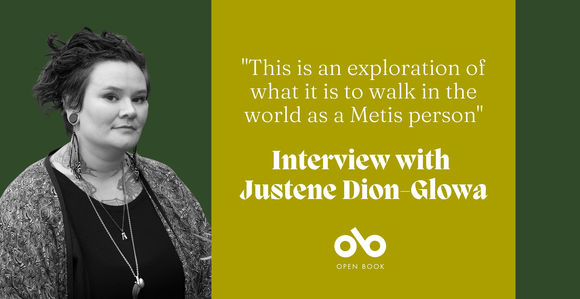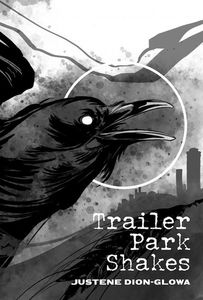"The Millennium Scoop is Killing Children" Justene Dion-Glowa's Spectacular Debut Poetry Collection Shines a Light on Injustice
Justene Dion-Glowa's debut full length poetry collection, Trailer Park Shakes (Brick Books), is packed with finely balanced pieces that manage to be playful, dreamy, and even darkly funny at times, while also containing searing indictment of the injustices Dion-Glowa has witnessed, particularly those perpetrated against the Metis community.
Systemic and institutional violence is called out in unflinching terms, while Dion-Glowa simultaneously makes space to show the depth, humanity, humour, joy, and fierce love of the characters in their pages. It's this lyrical high wire act that charges the collection with such power and shows Dion-Glowa's gift.
Dion-Glowa themself discusses the complexity of exploring "poverty [and] vicarious and direct trauma" alongside "the relationships that sustain us through it all–good or bad," saying, "Sometimes it can be so sad it’s funny...sometimes life just keeps punching down and you have to wonder... is this a joke?"
They join us today to talk about Trailer Park Shakes in depth as part of our Line & Lyric series, telling us about the huge impact a supportive early teacher had on their writing, the unfortunate paradox contained in our collective desire to participate in social media, and the heartbreaking reality behind their book's dedication.
Open Book:
Tell us about this collection and how it came to be.
Justene Dion-Glowa:
I was very fortunate to have had a teacher in Grade Six, Ian Kellet, who read my work and allowed me to spend the rest of the year doing poetry for English class. That’s where my love for it began, I suppose. I moved on to lyrics in high school; I was in a band that was a lot of fun and got my creativity flowing. Throughout motherhood, I took a lot of years off from writing. I initially began the poems in this collection in the summer of 2019 when I was laid off from a seasonal job. I chose to start submitting to journals at that time and even started an online lit mag of my own, 3 Moon Magazine. I have since stepped away from that project, but it was incredibly fulfilling at that time—all I did was write and read poetry. In the end, I submitted half of this collection to a contest with another publisher, and despite winning that contest, I realized the publisher did not align with my values, so I turned down the prize. Around that same time, Brick Books had let me know they were interested in my other works. Luckily for me they were willing to read all the other work I hadn’t given them yet, and that’s become the full collection.
OB:
Can you tell us a bit about how you chose your title? If it’s a title of one of the poems, how does that piece fit into the collection? If it’s not a poem title, how does it encapsulate the collection as a whole?
JDG:
It is not a poem title, but it is a line from one of the poems. I feel like it encapsulates the collection because for me, the line and the poem it is from are about the complexity of poverty, of vicarious and direct trauma, and of the relationships that sustain us through it all–good or bad. And it’s about how sometimes it can be so sad it’s funny, which I’m unsure if others relate to, but sometimes life just keeps punching down and you have to wonder... is this a joke?
OB:
Do you find social media fits into your writing process at all? If so, how?
JDG:
It absolutely does. I think it’s undeniable that for most people of Turtle Island, social media is a daily part of life. The irony is it’s killing us. I think our humanity, our insatiable need to connect drives this, while simultaneously driving us apart from our real loved ones. So my references to online culture are sort of contrite and satirical – a juxtaposition of the perfection we present with the ugliness of reality.
Your CanLit News
Subscribe to Open Book’s newsletter to get local book events, literary content, writing tips, and more in your inbox
OB:
Who did you dedicate the collection to and why?
JDG:
The collection is dedicated to the youth who have passed away in the community I call home, colonially known as Kamloops. All but one of those have passed since August 2021. I believe that the Millennium Scoop is killing children, and we aren’t talking enough about the impacts of being in care for Metis, Indigenous, and Inuit communities. My hope is the shine a light on the reality of just how many of these kids end up dead just a year or two after aging out.
OB:
Is there’s an individual, specific speaker in any of these poems (whether yourself or a character)? Tell us a little about the perspective from which the poems are spoken.
JDG:
The speaker is definitely me. The perspective depends on the mood I’m in I suppose. Poems like "Aces" are very serious and blunt. Poems like "Hark, A Misandrist" are meant to be over-the-top sarcastic. Each piece is a little piece of me.
OB:
Was there a question or questions that you were exploring, consciously from the beginning or unconsciously and which becoming clear to you later, in this collection?
JDG:
I certainly wasn’t doing it intentionally in the beginning, but it did become clear this is an exploration of what it is to walk in the world as a Metis person. I think historically we have experienced great poverty and trauma, and my life is not different. And while I have mixed feelings about the word resilience, I think it is a defining feature of being Métis and of this work. I think that’s also why it was so important to me that even the cover artwork be by a Métis artist. I want Métis people to see themselves reflected in the world. And while I would hope their experiences do not match my own, there is also a power in knowing you’re not alone.
OB:
What are you working on next?
JDG:
I am hoping to work on a hybrid art/poetry project that explores how the digital space has profoundly altered our concepts of death, dying and illness, the numbing effect this can have, and the challenge of processing this while maintaining our humanity.
______________________________________________
Justene Dion-Glowa is a queer Métis creative, beadworker and poet born in Win-Nipi (Winnipeg) and has been residing in Secwepemcú’lecw since 2014. They are a Banff Centre for Arts and Creativity alumni. They have been working in the human services field for nearly a decade. Their microchap, TEETH, is available from Ghost City Press. Trailer Park Shakes is their first full length poetry book.






